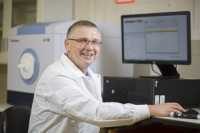28 Apr Diet Foods Can Make You Fat By Changing Your Microbiome
MedicalResearch.com Interview with:
Krzysztof Czaja VBDI, D.V.M
Associate professor of veterinary biosciences and diagnostic imaging
College of Veterinary Medicine
University of Georgia
MedicalResearch.com: What is the background for this study?
Response: The neural regulation of food intake and satiety in rodents and human are similar. Therefore, rodent model is well established in studying neural regulation in obesity in humans.
MedicalResearch.com: What are the main findings?
Response: We determined that diets rich in sugar, and many “diet products” contain high amount of sugar (sometimes under different names), increase efficiency of accumulation of body and liver fat. We also found that sugar-rich diets change the gut microflora toward overpopulation of enterotoxic bacteria, damaging neural gut-brain communication and disrupting neural regulation of food intake. The implications of our results on human health are very significant because they show that diets rich in sugar changes the brain circuits responsible for food intake and satiety, induces chronic inflammation and symptoms of non-alcoholic liver disease (NALD).
MedicalResearch.com: What should readers take away from your report?
Response: Both the chronic inflammation and NALD are often diagnosed in obese adults as well as children, what tells us that we are on the right track. Additionally, the results determined that those diet-induced brain changes are the effect of microbiota-driven damage of vagal gut-brain communication. Our results enable the treatments for obesity in human based on gut microbiome manipulations. They also open the possibility of microbiota-based treatments of cancer, mood disorders and depression and neurodegenerative diseases.
MedicalResearch.com: What recommendations do you have for future research as a result of this study?
Response: The next step in our research is to determine if diet-induced changes in the brain can be suppressed or even reversed. Researchers should focus on the connection between diet, gut microbiota, vagal gut-brain communication and how they affect brain structure and function. We are just at the beginning of discovering a “magic” bacteria cocktail to treat the biggest pandemic of the modern society which is obesity.
MedicalResearch.com: Thank you for your contribution to the MedicalResearch.com community.
Citation:
Tanusree Sen, Carolina R. Cawthon, Benjamin Thomas Ihde, Andras Hajnal, Patricia M. DiLorenzo, Claire B. de La Serre, Krzysztof Czaja. Diet-driven microbiota dysbiosis is associated with vagal remodeling and obesity. Physiology & Behavior, 2017; 173: 305 DOI: 10.1016/j.physbeh.2017.02.027
Note: Content is Not intended as medical advice. Please consult your health care provider regarding your specific medical condition and questions.
More Medical Research Interviews on MedicalResearch.com
[wysija_form id=”5″]
Last Updated on April 28, 2017 by Marie Benz MD FAAD

